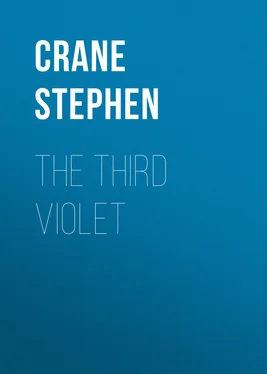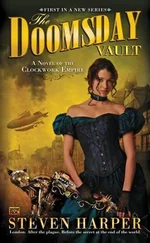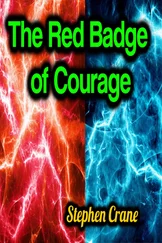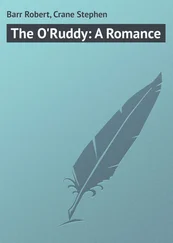Stephen Crane - The Third Violet
Здесь есть возможность читать онлайн «Stephen Crane - The Third Violet» — ознакомительный отрывок электронной книги совершенно бесплатно, а после прочтения отрывка купить полную версию. В некоторых случаях можно слушать аудио, скачать через торрент в формате fb2 и присутствует краткое содержание. Жанр: literature_19, foreign_antique, foreign_prose, Зарубежные любовные романы, на английском языке. Описание произведения, (предисловие) а так же отзывы посетителей доступны на портале библиотеки ЛибКат.
- Название:The Third Violet
- Автор:
- Жанр:
- Год:неизвестен
- ISBN:нет данных
- Рейтинг книги:4 / 5. Голосов: 1
-
Избранное:Добавить в избранное
- Отзывы:
-
Ваша оценка:
- 80
- 1
- 2
- 3
- 4
- 5
The Third Violet: краткое содержание, описание и аннотация
Предлагаем к чтению аннотацию, описание, краткое содержание или предисловие (зависит от того, что написал сам автор книги «The Third Violet»). Если вы не нашли необходимую информацию о книге — напишите в комментариях, мы постараемся отыскать её.
The Third Violet — читать онлайн ознакомительный отрывок
Ниже представлен текст книги, разбитый по страницам. Система сохранения места последней прочитанной страницы, позволяет с удобством читать онлайн бесплатно книгу «The Third Violet», без необходимости каждый раз заново искать на чём Вы остановились. Поставьте закладку, и сможете в любой момент перейти на страницу, на которой закончили чтение.
Интервал:
Закладка:
Stephen Crane
The Third Violet
CHAPTER I
The engine bellowed its way up the slanting, winding valley. Grey crags, and trees with roots fastened cleverly to the steeps looked down at the struggles of the black monster.
When the train finally released its passengers they burst forth with the enthusiasm of escaping convicts. A great bustle ensued on the platform of the little mountain station. The idlers and philosophers from the village were present to examine the consignment of people from the city. These latter, loaded with bundles and children, thronged at the stage drivers. The stage drivers thronged at the people from the city.
Hawker, with his clothes case, his paint-box, his easel, climbed awkwardly down the steps of the car. The easel swung uncontrolled and knocked against the head of a little boy who was disembarking backward with fine caution. "Hello, little man," said Hawker, "did it hurt?" The child regarded him in silence and with sudden interest, as if Hawker had called his attention to a phenomenon. The young painter was politely waiting until the little boy should conclude his examination, but a voice behind him cried, "Roger, go on down!" A nursemaid was conducting a little girl where she would probably be struck by the other end of the easel. The boy resumed his cautious descent.
The stage drivers made such great noise as a collection that as individuals their identities were lost. With a highly important air, as a man proud of being so busy, the baggageman of the train was thundering trunks at the other employees on the platform. Hawker, prowling through the crowd, heard a voice near his shoulder say, "Do you know where is the stage for Hemlock Inn?" Hawker turned and found a young woman regarding him. A wave of astonishment whirled into his hair, and he turned his eyes quickly for fear that she would think that he had looked at her. He said, "Yes, certainly, I think I can find it." At the same time he was crying to himself: "Wouldn't I like to paint her, though! What a glance—oh, murder! The—the—the distance in her eyes!"
He went fiercely from one driver to another. That obdurate stage for Hemlock Inn must appear at once. Finally he perceived a man who grinned expectantly at him. "Oh," said Hawker, "you drive the stage for Hemlock Inn?" The man admitted it. Hawker said, "Here is the stage." The young woman smiled.
The driver inserted Hawker and his luggage far into the end of the vehicle. He sat there, crooked forward so that his eyes should see the first coming of the girl into the frame of light at the other end of the stage. Presently she appeared there. She was bringing the little boy, the little girl, the nursemaid, and another young woman, who was at once to be known as the mother of the two children. The girl indicated the stage with a small gesture of triumph. When they were all seated uncomfortably in the huge covered vehicle the little boy gave Hawker a glance of recognition. "It hurted then, but it's all right now," he informed him cheerfully.
"Did it?" replied Hawker. "I'm sorry."
"Oh, I didn't mind it much," continued the little boy, swinging his long, red-leather leggings bravely to and fro. "I don't cry when I'm hurt, anyhow." He cast a meaning look at his tiny sister, whose soft lips set defensively.
The driver climbed into his seat, and after a scrutiny of the group in the gloom of the stage he chirped to his horses. They began a slow and thoughtful trotting. Dust streamed out behind the vehicle. In front, the green hills were still and serene in the evening air. A beam of gold struck them aslant, and on the sky was lemon and pink information of the sun's sinking. The driver knew many people along the road, and from time to time he conversed with them in yells.
The two children were opposite Hawker. They sat very correctly mucilaged to their seats, but their large eyes were always upon Hawker, calmly valuing him.
"Do you think it nice to be in the country? I do," said the boy.
"I like it very well," answered Hawker.
"I shall go fishing, and hunting, and everything. Maybe I shall shoot a bears."
"I hope you may."
"Did you ever shoot a bears?"
"No."
"Well, I didn't, too, but maybe I will. Mister Hollanden, he said he'd look around for one. Where I live–"
"Roger," interrupted the mother from her seat at Hawker's side, "perhaps every one is not interested in your conversation." The boy seemed embarrassed at this interruption, for he leaned back in silence with an apologetic look at Hawker. Presently the stage began to climb the hills, and the two children were obliged to take grip upon the cushions for fear of being precipitated upon the nursemaid.
Fate had arranged it so that Hawker could not observe the girl with the—the—the distance in her eyes without leaning forward and discovering to her his interest. Secretly and impiously he wriggled in his seat, and as the bumping stage swung its passengers this way and that way, he obtained fleeting glances of a cheek, an arm, or a shoulder.
The driver's conversation tone to his passengers was also a yell. "Train was an hour late t'night," he said, addressing the interior. "It'll be nine o'clock before we git t' th' inn, an' it'll be perty dark travellin'."
Hawker waited decently, but at last he said, "Will it?"
"Yes. No moon." He turned to face Hawker, and roared, "You're ol' Jim Hawker's son, hain't yeh?"
"Yes."
"I thort I'd seen yeh b'fore. Live in the city now, don't yeh?"
"Yes."
"Want t' git off at th' cross-road?"
"Yes."
"Come up fer a little stay doorin' th' summer?"
"Yes."
"On'y charge yeh a quarter if yeh git off at cross-road. Useter charge 'em fifty cents, but I ses t' th' ol' man. 'Tain't no use. Goldern 'em, they'll walk ruther'n put up fifty cents.' Yep. On'y a quarter."
In the shadows Hawker's expression seemed assassinlike. He glanced furtively down the stage. She was apparently deep in talk with the mother of the children.
CHAPTER II
When Hawker pushed at the old gate, it hesitated because of a broken hinge. A dog barked with loud ferocity and came headlong over the grass.
"Hello, Stanley, old man!" cried Hawker. The ardour for battle was instantly smitten from the dog, and his barking swallowed in a gurgle of delight. He was a large orange and white setter, and he partly expressed his emotion by twisting his body into a fantastic curve and then dancing over the ground with his head and his tail very near to each other. He gave vent to little sobs in a wild attempt to vocally describe his gladness. "Well, 'e was a dreat dod," said Hawker, and the setter, overwhelmed, contorted himself wonderfully.
There were lights in the kitchen, and at the first barking of the dog the door had been thrown open. Hawker saw his two sisters shading their eyes and peering down the yellow stream. Presently they shouted, "Here he is!" They flung themselves out and upon him. "Why, Will! why, Will!" they panted.
"We're awful glad to see you!" In a whirlwind of ejaculation and unanswerable interrogation they grappled the clothes case, the paint-box, the easel, and dragged him toward the house.
He saw his old mother seated in a rocking-chair by the table. She had laid aside her paper and was adjusting her glasses as she scanned the darkness. "Hello, mother!" cried Hawker, as he entered. His eyes were bright. The old mother reached her arms to his neck. She murmured soft and half-articulate words. Meanwhile the dog writhed from one to another. He raised his muzzle high to express his delight. He was always fully convinced that he was taking a principal part in this ceremony of welcome and that everybody was heeding him.
"Have you had your supper?" asked the old mother as soon as she recovered herself. The girls clamoured sentences at him. "Pa's out in the barn, Will. What made you so late? He said maybe he'd go up to the cross-roads to see if he could see the stage. Maybe he's gone. What made you so late? And, oh, we got a new buggy!"
Читать дальшеИнтервал:
Закладка:
Похожие книги на «The Third Violet»
Представляем Вашему вниманию похожие книги на «The Third Violet» списком для выбора. Мы отобрали схожую по названию и смыслу литературу в надежде предоставить читателям больше вариантов отыскать новые, интересные, ещё непрочитанные произведения.
Обсуждение, отзывы о книге «The Third Violet» и просто собственные мнения читателей. Оставьте ваши комментарии, напишите, что Вы думаете о произведении, его смысле или главных героях. Укажите что конкретно понравилось, а что нет, и почему Вы так считаете.












